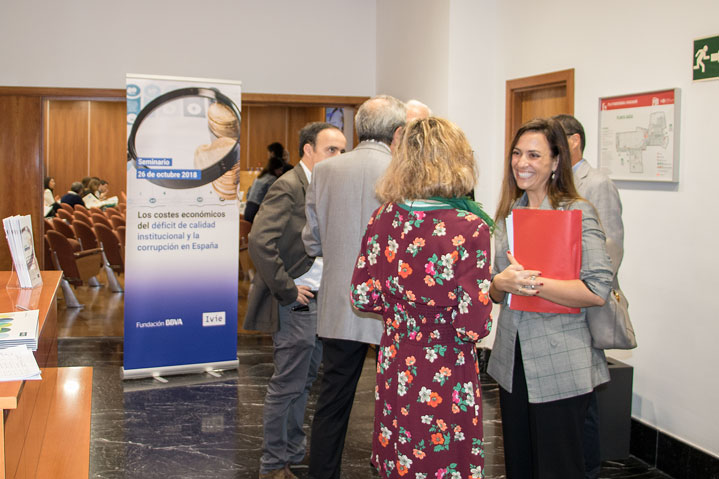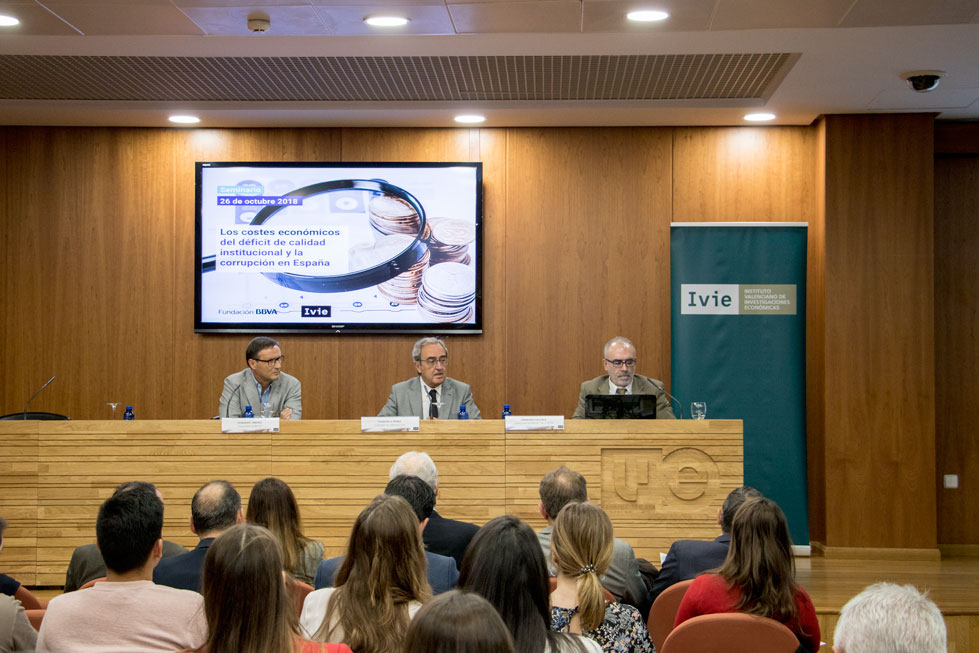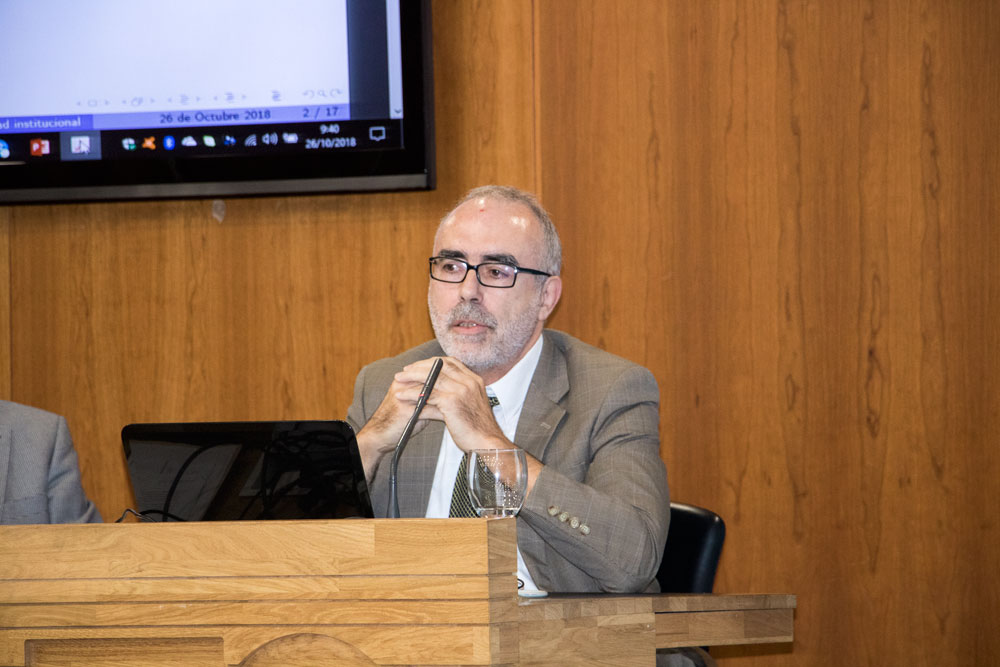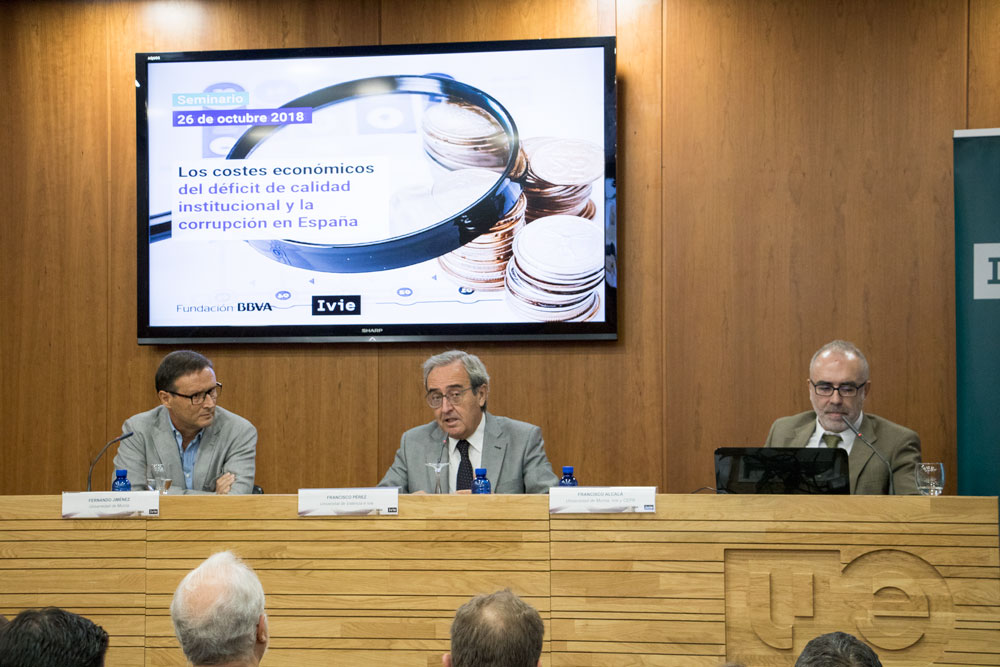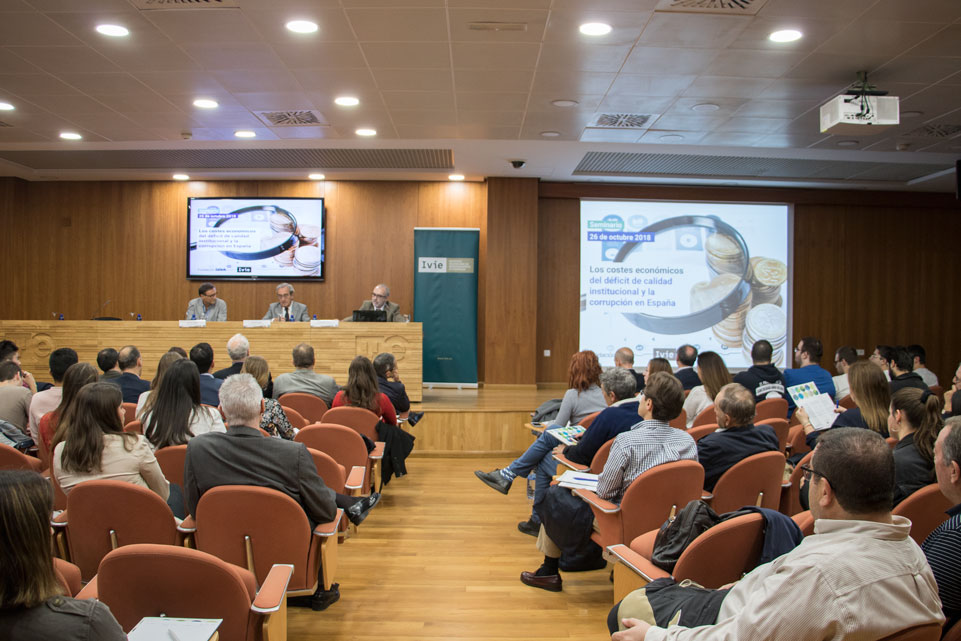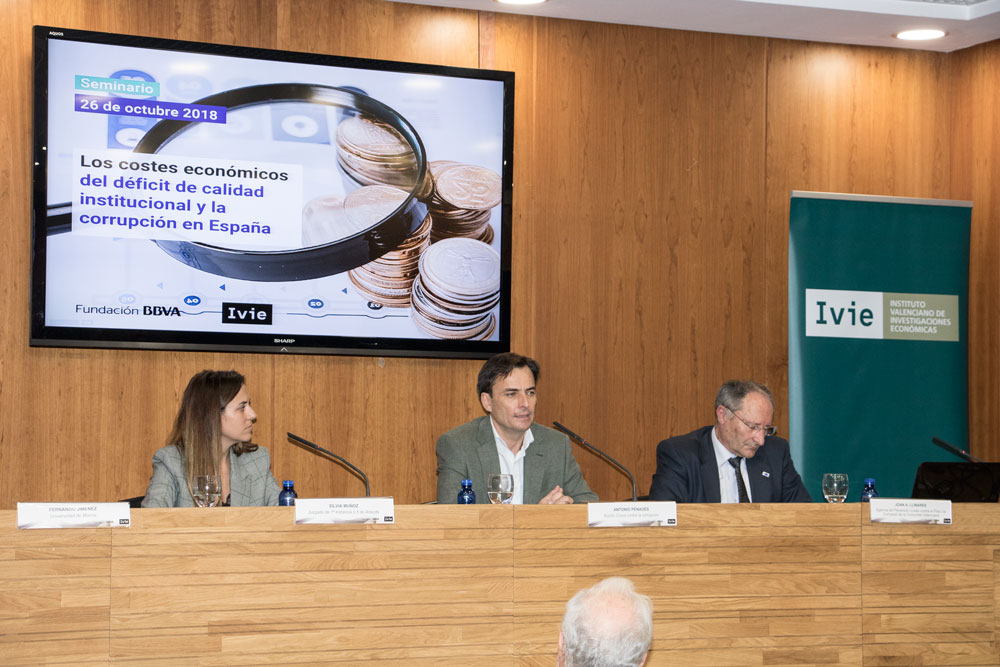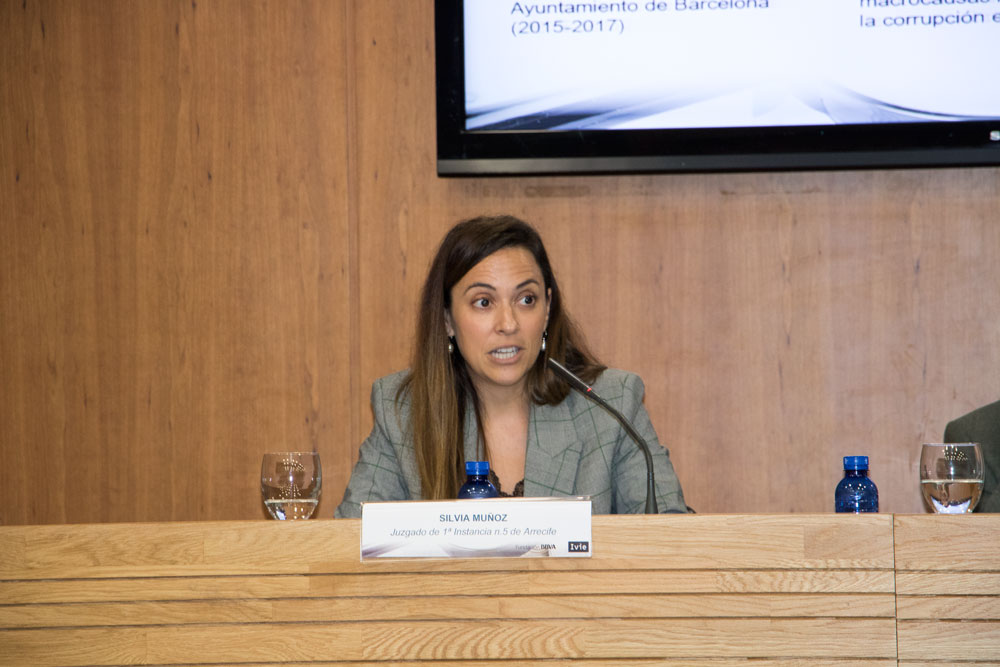Esta web utiliza cookies para que podamos ofrecerte la mejor experiencia de usuario posible. La información de las cookies se almacena en tu navegador y realiza funciones tales como reconocerte cuando vuelves a nuestra web o ayudar a nuestro equipo a comprender qué secciones de la web encuentras más interesantes y útiles.
News
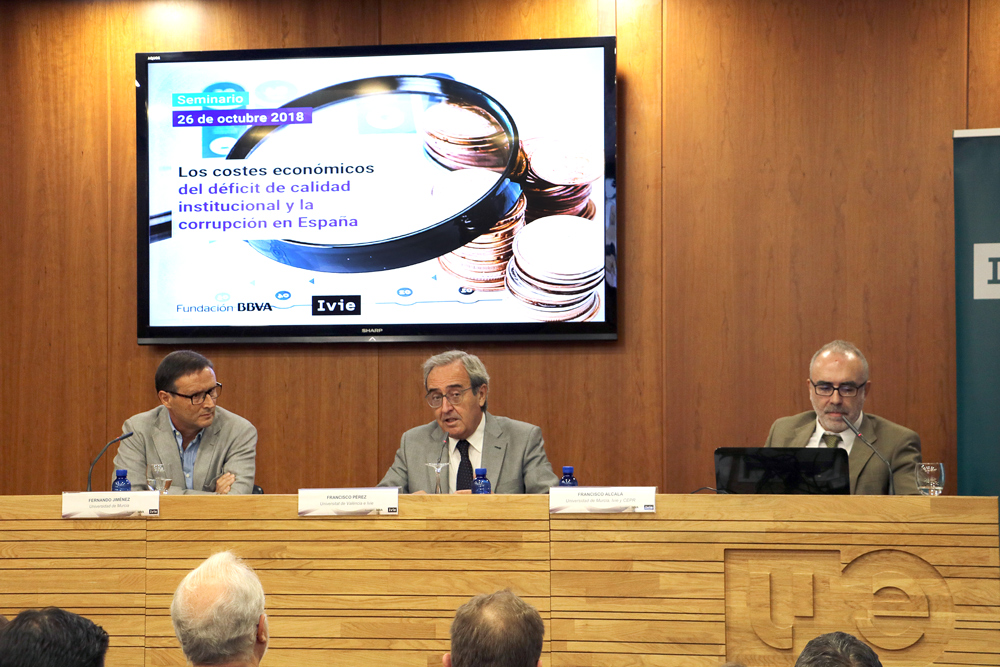
Improving institutional quality and ending corruption could raise Spain’s GDP per capita by 16% in a fifteen-year period
This would imply around one additional percentage point on economic growth each year
Spain’s governing institutions are among the 20% of the world’s highest-ranked countries in terms of quality, according to the Worldwide Governance Indicators (WGI), compiled by the World Bank and containing information on 154 countries. However, the results for Spain are lower than what would be expected for a country with its level of economic development. Spain ranked 6.8 out of 10 in the combined institutional quality indicator, against the average of 8 for Germany, France and the United Kingdom, which represent advanced economy models. However, Spain does rank above other Mediterranean economies such as Italy or Greece, whose average institutional quality score is just 5.8.
The report Los costes económicos del déficit de calidad institucional y la corrupción en España (The economic cost of the institutional quality deficit and corruption in Spain), jointly produced by the BBVA Foundation and the Ivie, calculates this combined quality indicator as the average of the five indicators provided in the WGI. The five indicators analyzed are voice and accountability (democracy and public freedoms), effectiveness, regulatory quality, rule of law and control of corruption. The level of institutional quality obtained according to this combined indicator places Spain around percentile 81 (that is, among the top 20% of countries in terms of quality at the global level). Spanish productivity, however, lies significantly higher, around percentile 85 (percentile 100 represents the world’s most productive country and percentile 1, the least productive). Institutional quality is therefore a relative weakness in the Spanish economy.
The country performs best in the categories of voice and accountability, rule of law, and government effectiveness. At the other end scale, Spain’s greatest weaknesses appear in indicators for the category regulatory quality, lying 1.2 points below Germany, France and the United Kingdom, and notably in the control of corruption category (2.3 points below). The analysis of the WGI data also reveals a slightly declining trend in Spain’s institutional quality between 2003 and 2017, falling from 7.8 to 6.8 in the overall indicator. Raising institutional quality to the level corresponding to its productivity would give Spain a 16% increase in GDP per capita over a 15-year period, according to clarifications this morning from Ivie researcher Francisco Alcalá, and lecturer at the University of Murcia Fernando Jiménez, co-directors of the report presented in the seminar Los costes económicos del déficit de calidad institucional y la corrupción en España held today in Valencia. This would increase the average annual growth of the Spanish economy by around one percentage point over a 15-year period.
According to Alcalá, improved institutional quality would have a positive impact on GDP through mechanisms that would boost investment and productivity, which in turn would raise production and employment. Greater legal certainty, reduced corruption, elimination of administrative constraints, better regulation, higher levels of competence, and so on would incentivize national and foreign investment, make business ventures and innovation easier and more profitable, and improve the allocation of private and public resources to more productive activities.
During today’s presentation of the report, Fernando Jiménez also detailed some of its recommendations on how to raise institutional quality in Spain, which are classified into three main lines of action:
- Strengthening checks and balances on power:
- Guarantee the independence and means of judicial power. Recommendations include strengthening the independence of bodies such as the CGPJ (General Council of the Judiciary) and the Constitutional Tribunal; modernising the criminal procedure code to streamline judicial inquiries; reducing the number of aforados (individuals granted the privilege of being tried in a higher court); and increasing protection for those who report corruption (whistleblowers).
- Control of legislative bodies in all territorial spheres. The report suggests increasing resources and personnel specialized in the work of parliamentary and municipal representatives; creating a public policy evaluation office at the heart of government; and reinforcing transparency, responsibility and accountability in institutions
- Strengthen the independence of supervisory bodies such as the Courts of Auditors, the Independent Authority for Fiscal Responsibility, Transparency Councils and Ombudsmen
- Eliminate interference in the mass media and maximize the impartiality of governmental bodies in their relations with the media. The report recommends introducing objective criteria for the allocation of resources for advertising and the granting of subsidies and licenses.
- Improving independence, quality and transparency in the public administration system:
- Regulatory quality. The report recommends simplifying regulations and strengthening the independence of regulatory bodies such as the National Securities Market Commission (CNMV) and the National Commission for Markets and Competition (CNMC).
- Depoliticisation of the upper levels of the public administrations and their instrumental bodies. Reduce designation of positions of trust and limit them to the highest level in the organization; provide the public administration with professional public managers; implement objective selection procedures; separate political and administrative careers.
- Transparency of public bodies and evaluation of their services. Full transparency of public spending; accessible and clear information; performance evaluation mechanisms for services such as health and education.
- Improve the effectiveness of elections as mechanisms of selection and control:
- Freeing up of electoral lists. Change the electoral system to replace closed and blocked lists with lists where voters can reject the worst performing candidates.
The seminar Los costes económicos del déficit de calidad institucional y la corrupción en España, held this morning in Valencia and organized by the BBVA Foundation and the Ivie, began with the presentation of the above-mentioned report by its co-directors. This presentation was followed by two discussion sessions on the general problem of institutional quality deficit and corruption in Spain and the lines of action needed to combat it. Participating in the debates were Professor Carlos Sebastián; Manuel Villoria, Professor of Political Science and Administration at the Universidad Rey Juan Carlos; Juan José Ganuza, Professor of Economics and Business at the Universitat Pompeu Fabra and director of the Strategy and Industrial Economics Division at Funcas; Joan A. Llinares, director of the Valencian Community’s Agency for Preventing and Combating Fraud and Corruption; Silvia Muñoz, sitting judge of the Court of First Instance nº 5 in Arrecife (Lanzarote); and Antonio Penadés, president of Civic Action against Corruption


